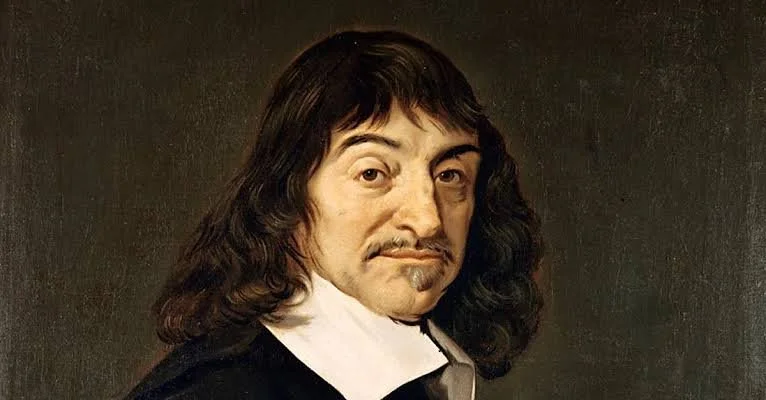René Descartes (1596 – 1650)
Descartes had a typical broad education under the Jesuits. He studied classics, ethics, mathematics and theology. At university he studied law but then became a soldier, becoming able at riding and fencing. It was during his military training that his love of mathematics and logic came to the fore. His passion for trying to think out the larger questions of life then took over. He became involved with the Rosicrucians, a secret order that sought to discover the “mysterious esoteric truths of the ancient past", which "concealed from the average man, provide insight into nature, the physical universe, and the spiritual realm." He began to be involved in meditation to try and discover these secrets. The Rosicrucian manifestos proclaimed a "universal reformation of mankind", through a science allegedly kept secret for decades until the intellectual climate might receive it. Descartes was trying to discover answers from within himself.
On November 10th 1619, whilst in a deeper meditative state than normal, he had a flash of inspiration which he felt opened up a completely new from of science. He then had a series of memorable dreams. In the first he was lame and sought refuge from a storm in a church. In the second he was also in a violent storm with thunder and showers of sparks around him. In the third he opened a book written by a Roman poet, Ausonius, (c. 310 – c. 395 AD) where he read these words,
“Which way of life shall I follow?’
This experience had a profound effect on him. During the next eight years he spent much time meditating and seeking for deeper truths. Although he remained a Roman Catholic he did have an illegitimate son. He also wrote a treatise called ‘The World’ in which he sided with Copernicus who had claimed that the earth was a planet that the earth moves round the sun. Just at this time he heard of the way the Inquisition had condemned his contemporary, Galileo for publishing similar ideas so he did not publish this as a book! However he did publish the new ideas he had had since he had been meditating which did result in the church authorities accusing him of atheism. Consequently he fled to Sweden where he died a year later.
Although he always wanted to remain within the Roman Catholic church, he had strong feelings against its authoritarianism and the prescriptive way people were taught. He thought that ordinary people could find the truth for themselves without having to study the sacred texts and the eruditions of the scholars or follow the dictats of the pontiff. He felt that all ideas could be tested internally and that the truth would reveal itself by being ‘clear and distinct’ just as a mathematician determines the truth of theorem. People must determine by constantly doubting and double checking any ideas presented to them.
His meditation and thinking led him to realise how imperfect he and his thinking processes were. He argued that seeing himself as imperfect meant that there must be a perfect being, there must be a god but this argument was later ridiculed by others, opening the door to atheistic philosophies that are also based on Descartes suppositions that start with man.
Descartes thinking begins with himself. The fact that he could think led him to assume that he existed. He classically said,
“I think, therefore I am.”
By placing what seems reasonable and clear and distinct as the judge of what is true opened the doors to many subsequent philosophies, most of which accepted Descartes foundation that man is the judge of all things. Even the existence of God is brought before the mind of man to decide whether that concept is reasonable and clear and distinct.
The tide was turning. Now it is God who is in the dock and man is the judge. Man is supreme and God, instead of being worshipped and obeyed, becomes the object of study. The difficulty is that it is impossible to put God under a finite microscope when he himself is infinite and we are definitely finite!
The scholar and writer, C.S.Lewis astutely analysed this tendency man always has to minimalise their own sin and to place Almighty God in the dock:
“The greatest barrier I have met is the almost total absence from the minds of my audience of any sense of sin... The early Christian preachers could assume in their hearers, whether Jews, Metuentes, or Pagans, a sense of guilt. (That this was common among Pagans is shown by the fact that both Epicureanism and the mystery religions both claimed, though in different ways, to assuage it.) Thus the Christian message was in those days unmistakably the Evangelium, the Good News. It promised healing to those who knew they were sick. We have to convince our hearers of the unwelcome diagnosis before we can expect them to welcome the news of the remedy.
The ancient man approached God (or even the gods) as the accused person approaches his judge. For the modern man, the roles are quite reversed. He is the judge: God is in the dock. He is quite a kindly judge; if God should have a reasonable defence for being the god who permits war, poverty, and disease, he is ready to listen to it. The trial may even end in God’s acquittal. But the important thing is that man is on the bench and God is in the dock.”
It was Descartes who publicised this way of thinking, but ever since Adam, mankind has always tended to sideline and disregard God; at root this is what ‘sin’ is.
BVP
